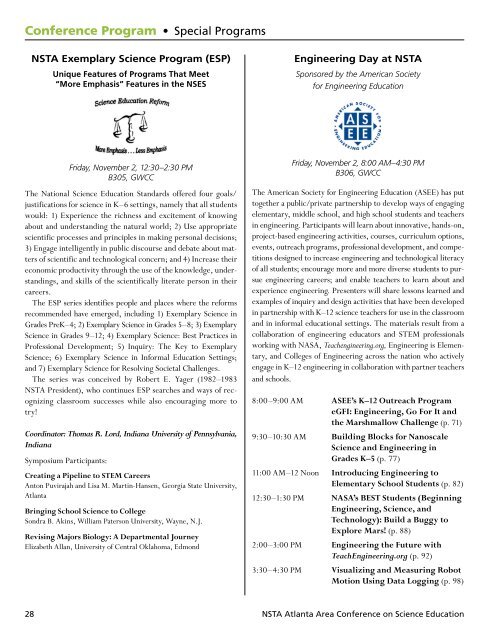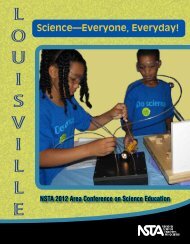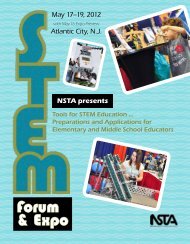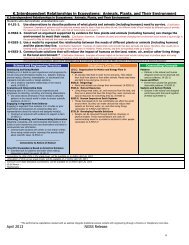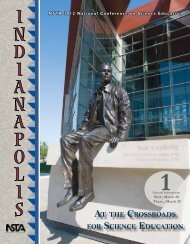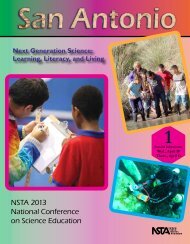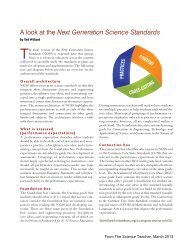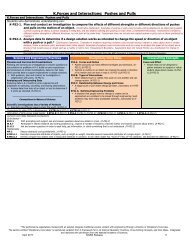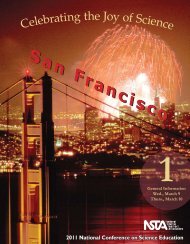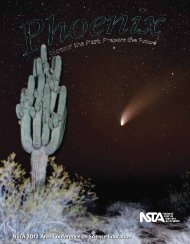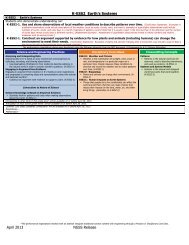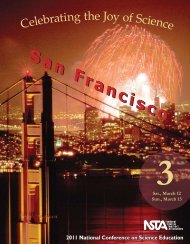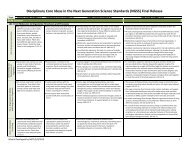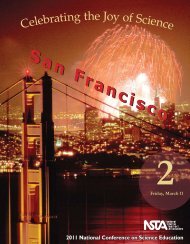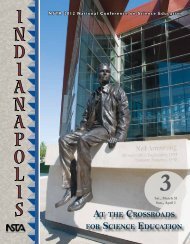Atlanta Conference Program
Atlanta Conference Program
Atlanta Conference Program
Create successful ePaper yourself
Turn your PDF publications into a flip-book with our unique Google optimized e-Paper software.
<strong>Conference</strong> <strong>Program</strong> • Special <strong>Program</strong>s<br />
NSTA Exemplary Science <strong>Program</strong> (ESP)<br />
Unique Features of <strong>Program</strong>s That Meet<br />
“More Emphasis” Features in the NSES<br />
Engineering Day at NSTA<br />
Sponsored by the American Society<br />
for Engineering Education<br />
Friday, November 2, 12:30–2:30 PM<br />
B305, GWCC<br />
The National Science Education Standards offered four goals/<br />
justifications for science in K–6 settings, namely that all students<br />
would: 1) Experience the richness and excitement of knowing<br />
about and understanding the natural world; 2) Use appropriate<br />
scientific processes and principles in making personal decisions;<br />
3) Engage intelligently in public discourse and debate about matters<br />
of scientific and technological concern; and 4) Increase their<br />
economic productivity through the use of the knowledge, understandings,<br />
and skills of the scientifically literate person in their<br />
careers.<br />
The ESP series identifies people and places where the reforms<br />
recommended have emerged, including 1) Exemplary Science in<br />
Grades PreK–4; 2) Exemplary Science in Grades 5–8; 3) Exemplary<br />
Science in Grades 9–12; 4) Exemplary Science: Best Practices in<br />
Professional Development; 5) Inquiry: The Key to Exemplary<br />
Science; 6) Exemplary Science in Informal Education Settings;<br />
and 7) Exemplary Science for Resolving Societal Challenges.<br />
The series was conceived by Robert E. Yager (1982–1983<br />
NSTA President), who continues ESP searches and ways of recognizing<br />
classroom successes while also encouraging more to<br />
try!<br />
Coordinator: Thomas R. Lord, Indiana University of Pennsylvania,<br />
Indiana<br />
Symposium Participants:<br />
Creating a Pipeline to STEM Careers<br />
Anton Puvirajah and Lisa M. Martin-Hansen, Georgia State University,<br />
<strong>Atlanta</strong><br />
Bringing School Science to College<br />
Sondra B. Akins, William Paterson University, Wayne, N.J.<br />
Revising Majors Biology: A Departmental Journey<br />
Elizabeth Allan, University of Central Oklahoma, Edmond<br />
Friday, November 2, 8:00 AM–4:30 PM<br />
B306, GWCC<br />
The American Society for Engineering Education (ASEE) has put<br />
together a public/private partnership to develop ways of engaging<br />
elementary, middle school, and high school students and teachers<br />
in engineering. Participants will learn about innovative, hands-on,<br />
project-based engineering activities, courses, curriculum options,<br />
events, outreach programs, professional development, and competitions<br />
designed to increase engineering and technological literacy<br />
of all students; encourage more and more diverse students to pursue<br />
engineering careers; and enable teachers to learn about and<br />
experience engineering. Presenters will share lessons learned and<br />
examples of inquiry and design activities that have been developed<br />
in partnership with K–12 science teachers for use in the classroom<br />
and in informal educational settings. The materials result from a<br />
collaboration of engineering educators and STEM professionals<br />
working with NASA, Teachengineering.org, Engineering is Elementary,<br />
and Colleges of Engineering across the nation who actively<br />
engage in K–12 engineering in collaboration with partner teachers<br />
and schools.<br />
8:00–9:00 AM ASEE’s K–12 Outreach <strong>Program</strong><br />
eGFI: Engineering, Go For It and<br />
the Marshmallow Challenge (p. 71)<br />
9:30–10:30 AM Building Blocks for Nanoscale<br />
Science and Engineering in<br />
Grades K–5 (p. 77)<br />
11:00 AM–12 Noon Introducing Engineering to<br />
Elementary School Students (p. 82)<br />
12:30–1:30 PM NASA’s BEST Students (Beginning<br />
Engineering, Science, and<br />
Technology): Build a Buggy to<br />
Explore Mars! (p. 88)<br />
2:00–3:00 PM Engineering the Future with<br />
TeachEngineering.org (p. 92)<br />
3:30–4:30 PM Visualizing and Measuring Robot<br />
Motion Using Data Logging (p. 98)<br />
28 NSTA <strong>Atlanta</strong> Area <strong>Conference</strong> on Science Education


